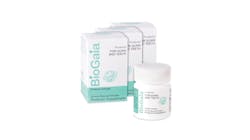Chairside Impact: Probiotic lozenges from BioGaia Prodentis
In today’s society, wellness, including probiotics, is a topic that’s gaining in popularity. The thought of microorganisms making your body healthier elicits a positive response in most people; however, what if they could enhance oral health as well? As clinicians, we know that the oral cavity can harbor millions of pathogenic bacteria, and as a result, periodontal disease and caries are common infections.1
There is a growing body of scientific evidence to support the benefits of probiotics on gastrointestinal health, yet many clinicians are unaware that they are also advantageous for improving oral health. Since probiotics contain different species of bacteria that make up our natural microflora, they exhibit a positive effect on our immune system by producing antimicrobial molecules.2
More Chairside Impact:
What are probiotics?
Probiotics are good, live bacteria that produce positive effects on their host and have unique characteristics that allow them to survive the intense acidity levels of the stomach and live in the intestines.3 They are found in fermented foods and nutritional dietary supplements. The health benefits are abundant—some bacteria are known to enhance digestion and improve absorption of micronutrients, while others exhibit positive effects in reducing the pathogens that cause caries, gingivitis, and more serious forms of periodontal disease.
BioGaia Prodentis
BioGaia’s Prodentis probiotics are great for daily preventive oral care, and they are highly effective in improving oral health by increasing the number of good bacteria in the oral cavity. L. reuteri DSM 17938 and L. reuteri ATCC PTA 5289 are the two species of bacteria most responsible for improving the health of teeth and gingival tissues. All BioGaia’s probiotics have been clinically tested in humans and shown to be safe and effective. With over 60 clinical studies in 2,355 individuals, BioGaia Prodentis is the probiotic most studied for oral health. Of these studies, 48 were randomized, double-blind/blind, and placebo-controlled.4
We have a responsibility to our patients
According to the ADA, more than 21% of US adults have untreated caries, and over 47% of adults over the age of 30 have periodontal disease.5,6 Moreover, dental decay is the most common, chronic disease of childhood with one in five children experiencing tooth decay by kindergarten.7
It is incumbent upon oral health-care professionals to use this knowledge to start chairside conversations with our patients. More people are seeking holistic options, and the oral cavity is a critical part of the body that can affect systemic health and vice versa. Discussing the oral-systemic connection is a great way to get patients interested in the use of probiotics, so I typically open my discussions with this theme.
We know that practicing good home care and getting regular cleanings can reduce the bacterial load, but taking a dietary supplement is revolutionary. By increasing the number of good bacteria, the growth of harmful bacteria is inhibited.8
For home-care maintenance, one lozenge twice daily for three to six months is the recommended dose. For chairside adjunctive therapy, five drops of Prodentis probiotic drops may be placed in each pocket using a microbrush and a dappen dish.
Restoring the microbiome can help reduce pocket depth and improve clinical attachment levels.9 The oral-systemic connection is clear; however, linking the oral microbiota to general, systemic health is the future of health care. BioGaia’s Prodentis line is also suitable for children and babies in lozenge and droplet form, so the whole family can reap the benefits.
Editor’s note: This article appeared in the June 2023 print edition of RDH magazine. Dental hygienists in North America are eligible for a complimentary print subscription. Sign up here.
References
- Oral Health. World Health Organization. March 14, 2023. https://www.who.int/news-room/fact-sheets/detail/oral-health
- Yesilyurt N, Yilmaz B, Agagunduz D, Capasso R. Involvement of probiotics and postbiotics in the immune system modulation. Biologics. July 6, 2021. https://www.mdpi.com/2673-8449/1/2/6
- Cleveland Clinic. Last reviewed March 9, 2020. https://my.clevelandclinic.org/health/articles/14598-probiotics
- Questions & answers. BioGaia. Accessed February 26, 2023. https://www.biogaia.com/products/questionsanswers/#what-is-lactobacillus-reuteri-prodentis
- Versaci MB. April JADA finds more than 1 in 5 US adults have untreated caries. American Dental Association. March 25, 2022. https://www.ada.org/publications/ada-news/2022/march/april-jada-finds-more-than-1-in-5-us-adults-have-untreated-caries.
- Scaling and root planing. MouthHealthy. American Dental Association. Accessed February
- 24, 2023. https://www.mouthhealthy.org/all-topics-a-z/scaling-and-root-planing
- Casamassimo PS, Chin JR, Conte CE, et al. Treating tooth decay: How to make the best restorative choices for children’s health. https://www.aapd.org/globalassets/media/policy-center/treatingtoothdecay.pdf
- Lukic J, Chen V, Strahinic I, et al. Probiotics or pro-healers: the role of beneficial bacteria in tissue repair. Wound Repair Regen. 2017;25(6):912-922. doi:10.1111/wrr.12607
- Martin-Cabezas R, Davideau JL, Tenenbaum H, Huck O. Clinical efficacy of probiotics as an adjunctive therapy to non-surgical periodontal treatment of chronic periodontitis: a systematic review and meta-analysis. J Clin Periodontol. 2016;43(6):520-530. doi:10.1111/jcpe.12545
About the Author

Vilma Cordero, MHSc, BASDH, RDH
Vilma Cordero, MHSc, BASDH, RDH, is a licensed hygienist in the states of Florida and North Carolina with over 13 years of dental clinical experience. She holds a master of health science in health-care administration and a bachelor of applied science in dental hygiene. Vilma is the owner/operator of Practical Hygiene Solutions, a dental coaching and consulting company in North Carolina. She is a member of the American Dental Hygienists' Association, American Dental Education Association, and the American Academy for Oral System Health.
